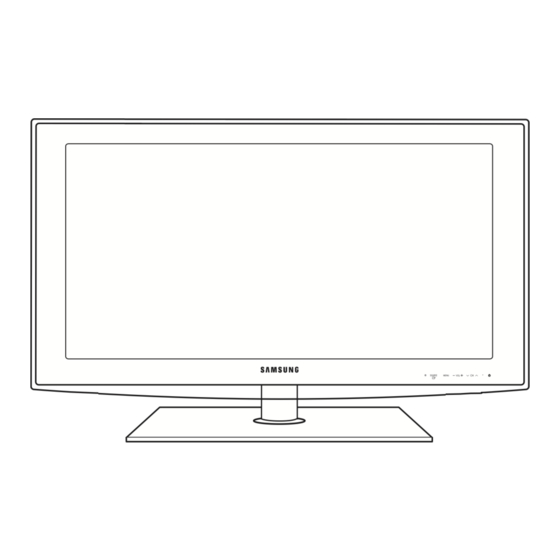Samsung 5 Series 사용자 설명서 - 페이지 12
{카테고리_이름} Samsung 5 Series에 대한 사용자 설명서을 온라인으로 검색하거나 PDF를 다운로드하세요. Samsung 5 Series 17 페이지. Samsung flat panel television user manual
Samsung 5 Series에 대해서도 마찬가지입니다: 빠른 시작 매뉴얼 (5 페이지), 빠른 설정 매뉴얼 (4 페이지), 사용자 설명서 (17 페이지), 전자 매뉴얼 (18 페이지), 사용자 설명서 (17 페이지), 설치 매뉴얼 (43 페이지), 사용자 설명서 (29 페이지), 사용자 설명서 (2 페이지), 사용자 설명서 (40 페이지), 사용자 설명서 (43 페이지), 사용자 설명서 (44 페이지), 빠른 시작 매뉴얼 (6 페이지), 사용자 설명서 (19 페이지), 사용자 설명서 (48 페이지), 사용자 설명서 (18 페이지), 빠른 시작 매뉴얼 (16 페이지), 설치 매뉴얼 (32 페이지), 사용자 설명서 (38 페이지), 사용자 설명서 (19 페이지), 사용자 설명서 (2 페이지), 사용자 설명서 (2 페이지), 사용자 설명서 (24 페이지), 사용자 설명서 (2 페이지), 사용자 설명서 (20 페이지), 사용자 설명서 (2 페이지), 사용자 설명서 (2 페이지), 사용자 설명서 (34 페이지), 빠른 설정 매뉴얼 (2 페이지), 사용자 설명서 (32 페이지), 사용자 설명서 (40 페이지), 사용자 설명서 (31 페이지), 사용자 설명서 (22 페이지), 사용자 설명서 (44 페이지), 사용자 설명서 (36 페이지), 사용자 설명서 (32 페이지), 사용자 설명서 (40 페이지), 빠른 시작 매뉴얼 (2 페이지), 빠른 설정 매뉴얼 (4 페이지), 사용자 설명서 (36 페이지), 사용자 설명서 (8 페이지), 사용자 설명서 (45 페이지), 빠른 설정 매뉴얼 (2 페이지), 빠른 설정 매뉴얼 (4 페이지), 사용자 설명서 (42 페이지), 설치 매뉴얼 (45 페이지), 사용자 설명서 (20 페이지), 사용자 설명서 (47 페이지), 빠른 설정 매뉴얼 (2 페이지), 사용자 설명서 (44 페이지), 빠른 설정 매뉴얼 (2 페이지), 사용자 설명서 (32 페이지), 사용자 설명서 (44 페이지), 사용자 설명서 (40 페이지), 빠른 설정 매뉴얼 (2 페이지), 사용자 설명서 (20 페이지), 사용자 설명서 (46 페이지), 사용자 설명서 (24 페이지), 사용자 설명서 (40 페이지), 사용자 설명서 (32 페이지), 매뉴얼 (33 페이지), 사용자 설명서 (29 페이지), 사용자 설명서 (17 페이지), 사용자 설명서 (48 페이지), 사용자 설명서 (50 페이지), 사용자 설명서 (44 페이지), 사용자 설명서 (24 페이지), 설치 매뉴얼 (34 페이지), 빠른 설정 매뉴얼 (4 페이지), 빠른 설정 매뉴얼 (4 페이지), 사용자 설명서 (24 페이지), 사용자 설명서 (24 페이지), 사용자 설명서 (48 페이지), 사용자 설명서 (28 페이지), 사용자 설명서 (24 페이지), 사용자 설명서 (2 페이지), 사용자 설명서 (19 페이지), 사용자 설명서 (17 페이지), 사용자 설명서 (36 페이지), 사용자 설명서 (19 페이지), 사용자 설명서 (19 페이지), 사용자 설명서 (27 페이지), 사용자 설명서 (19 페이지), 사용자 설명서 (44 페이지), 사용자 설명서 (48 페이지), 매뉴얼 (33 페이지), 사용자 설명서 (40 페이지), 사용자 설명서 (50 페이지), 사용자 설명서 (24 페이지), 매뉴얼 (36 페이지), 사용자 설명서 (20 페이지), (독일어) 설치 지침 (31 페이지)

